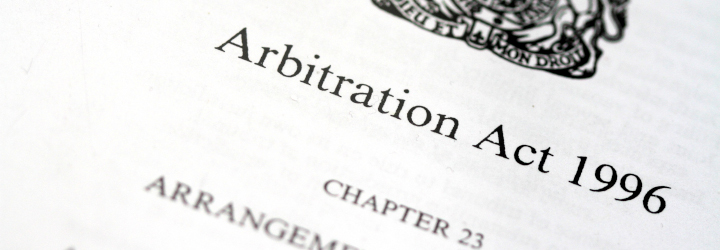Arbicon specialise in resolving construction disputes through Alternative Dispute Resolution (ADR) methods including Arbitration, an alternative to Court proceedings. The objective of Arbitration in construction is to resolve disputes fairly by an impartial tribunal, without unnecessary delays or costs for Main Contractors, Subcontractors or Building Employers. Each party to an Arbitration must be given a reasonable opportunity to put their case forward, with disputes resolved based on material facts, documents, and relevant principles of construction law.
Arbitration practice and procedure is governed by statute in England, Wales and Northern Ireland under the Arbitration Act 1996. The Act provides mandatory and optional rights to the parties, thus guidance in setting up an Arbitration agreement and the execution of Arbitration proceedings needs the care and help that Arbicon can provide.
Arbicon’s team of Experts take a tailored approach to your specific dispute, saving cost and time, providing a commercially viable dispute resolution process. We have over 40 years’ experience in resolving disputes in the construction industry, with Experts as Fellow members of the Chartered Institute of Arbitrators.
There is no statutory right to Arbitration in construction, for a dispute to be referred to Arbitration, the parties must first opt into it. A written clause is required in the construction contract, with the agreement stipulating the procedure to be adopted. The Arbitration Act 1996 provides the steps required in the Arbitration process, including certain components which are required when drafting an Arbitration agreement.
Benefits of Arbitration
Although the use of Arbitration is now limited due to other ADR methods being preferred in the construction industry, there are still many benefits to using Arbitration to resolve your construction dispute:
- Unlike Court proceedings, the dispute is held privately and confidentially.
- The parties are free to agree on an Arbitrator to be appointed, and therefore can ensure relevant experience in the construction matter.
- Legal costs can be recovered, the Arbitrator decides who pays the costs of their fees and the legal costs of the action, depending on any cost agreement or law in respect of "costs following the event".
- The speed of Arbitration can be an advantage; however, this will depend on the way the Arbitrator conducts the Arbitration.
- The Arbitration Award(s) are final, legally binding, enforceable, and difficult to appeal.
When to use Arbitration in Construction
Arbitration in construction can be used where a party or parties seek a final determination of a dispute, for instance if the dispute has previously been to Adjudication.
If there is no statutory right to adjudication, for example in a non-commercial construction contract, if an Arbitration clause is included, then Arbitration can be used as an alternative dispute resolution method to resolve the dispute.
Whether you are setting up your construction contract and are unsure whether to select Arbitration as the dispute resolution method, or you have a dispute that may need progressing to Arbitration, our Experts can help evaluate your dispute and determine whether Arbitration is the best solution for you.
Arbicon offer Arbitration either by appointing an Arbitrator or by representing the Client in Arbitration proceedings. We can also advise a third-party Arbitrator, where Arbicon are acting as advocates.
Arbicon advise on all matters relating to the Arbitration Act 1996 and the Arbitration process for all construction disputes. To find out more about Arbitration and whether it is the best ADR method for your particular issue, please use our contact form or call any of our offices.

